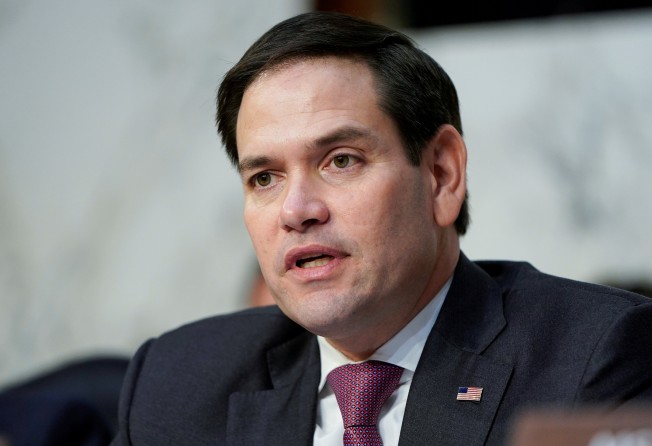Send top delegation to Taipei, American senators urge Donald Trump as 40th anniversary of Taiwan Relations Act nears
- President urged in bipartisan letter to ‘underscore our nation’s enduring commitment to island’s democracy’ at April event planned by de facto US embassy in Taipei
- Cheng Wen-tsan, mayor of Taoyuan City, says in Washington that Taiwan expects US to counter Chinese military presence in Indo-Pacific

A group of US senators have written to President Donald Trump asking him to send a senior delegation to Taiwan in April for a major event marking the 40th anniversary of the Taiwan Relations Act.
The bipartisan letter released on Monday said Brent Christensen, director of the American Institute in Taiwan (AIT) – the informal US embassy in Taipei – had “indicated his intention to hold a major event in April to celebrate the anniversary”.
Signed by 16 senators and initiated by influential Republican Marco Rubio and Democrat Bob Menendez, the letter requested that Trump “send a cabinet-level official to represent the United States at the AIT event in Taipei to underscore our nation’s enduring commitment to Taiwan’s democracy and its people”.
The letter came on the eve of the opening of the annual meeting in Beijing of the National People’s Congress, mainland China’s legislature, during which Premier Li Keqiang reiterated that Beijing “resolutely opposes Taiwan independence” and was “determined to protect our national sovereignty and territorial integrity”.
Separately, Cheng Wen-tsan, mayor of Taoyuan City in Taiwan, said in Washington that Taiwan, a “loyal” and “trusted” partner for the United States in the Indo-Pacific, expected the US to take action to “limit and balance” Beijing’s military presence in the region and maintain the status quo in the Taiwan Strait.
On a 12-day trip to the US, Cheng, a member of the pro-independence Democratic Progressive Party (DPP), also called for “greater support” from the US for Taiwan’s participation in global organisations and events.
Washington has no formal ties with Taiwan, but is bound by law to help defend the self-ruled island and is its main source of arms. The Taiwan Relations Act has been the cornerstone for US-Taiwan relations since the US cut official diplomatic ties with Taipei to formalise ties with Beijing in 1979.
Beijing views Taiwan as a breakaway province, to be united with the mainland by force if necessary. In a speech in January, Chinese President Xi Jinping did not rule out the use of force against Taiwan.
“We believe the presence of a senior delegation would send a strong signal of America’s unwavering commitment to and support for one of our strongest partners in the region,” the senators said in the letter to Trump.
They also urged the president “to fully implement the Taiwan Travel Act and the Asia Reassurance Initiative Act”.
The Taiwan Travel Act – signed by Trump in March last year after unanimous votes in both the House of Representatives and the Senate – allows high-level US officials to meet Taiwanese counterparts, but raised the ire of Beijing and added another layer of complication to relations between Washington, Beijing and Taipei.
Despite warnings from Beijing, US officials including Ian Steff, deputy assistant secretary for manufacturing, and Alex Wong, a deputy assistant secretary of state, have visited Taiwan since the introduction of the law.
“We believe that travel of this nature is important to ensure we are acting in accordance with our commitments under the Taiwan Relations Act, especially given Chinese efforts to change the cross-strait status quo,” the letter said.
Trump signed the Asia Reassurance Initiative Act into law at the end of last year to increase US security and economic interests in the Indo-Pacific region.
Senators from both parties, including Rubio, also wrote on February 7 to Nancy Pelosi, the House of Representatives speaker, urging her to invite Taiwanese President Tsai Ing-wen to address a joint session of Congress.
Cross-strait tensions have escalated since Tsai, also of the pro-independence DPP, became the island’s leader in May 2016. Since then, five nations have cut diplomatic relations with Taipei under pressure from Beijing, and China has increased its military presence around the island.
The US Navy sent warships through the Taiwan Strait last Monday, the second such transit in a month – demonstrating the US’ commitment to a “free and open Indo-Pacific”, the US Pacific Fleet said in a statement.
Cheng has said during his US tour that Beijing’s increasing military presence in the South China Sea, the Taiwan Strait and the Diaoyu Islands – claimed by mainland China, Taiwan and Japan, and known in Taiwan as the Diaoyutai and in Japan as the Senkakus – posed a challenge to regional security, and that Beijing was not playing by international rules.
US arms sales to Taiwan had become more normalised and collaboration on defence matters had improved, Cheng said.
Arguing that any compromises made by Beijing in trade talks with Washington would be only temporary, and that its trade friction with the US would be long-lasting, Cheng called for collaboration between Taiwan and the US in hi-tech and manufacturing sectors, and suggested more Taiwanese companies would relocate their production from mainland China to other Indo-Pacific locations.